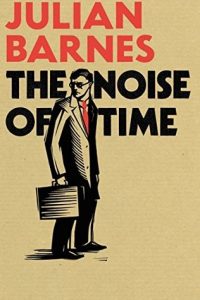Julian Barnes: The Noise of Time (March 2024)
 The Noise of Time is a fictionalised biography of Dmitry Shostakovich and his struggle to continue to compose under Stalin’s totalitarian regime. The book is divided into three particularly significant times in his life beginning in 1938.
The Noise of Time is a fictionalised biography of Dmitry Shostakovich and his struggle to continue to compose under Stalin’s totalitarian regime. The book is divided into three particularly significant times in his life beginning in 1938.
Shostakovich’s opera, ”Lady Macbeth of the Mtsensk District” has been derided by Stalin and condemned in the state run newspapers as ”a muddle instead of music” and “fidgety and neurotic”. Stalin’s control extends to all the arts and music has to be jingoistic and bombastic, appealing to the masses. No work that might be considered elite or avant-garde is permissable.
Shostakovich expects to be, as many others before him, arrested, interrogated, tortured and sent to a gulag to die. Rather than being dragged out of bed, possibly with his wife and child, he waits night after night, small suitcase packed, by the lift door outside his apartment. He survives by toeing the party line, but attempts to introduce irony into his music for discerning listeners.
In the second part, Shostakovich is sent on a propaganda tour of the United States where he is forced to denounce not only his own early work but also the music of Stravinsky, who he greatly admires. Although he presents his speech in a monotone hoping to indicate that he is not expressing his own opinions, he is publicly humiliated by Nicholas Nabokov. His supporters in the West cannot imagine the duress he is under to pander to his government or the danger to his family were he to defect.
Even after Stalin’s death he is not free and is forced to become a Party Member and Chairman of the Russian Federation of Composers. Although he is worn down by constant fear and oppression, Shostakovich does manage to privately compose his late string quartets.
The title ”The Noise of Time” is taken from the works of poet and essayist Osip Mandelstram, an outspoken critic of Stalin who died in imprisonment after the Great Purge.
Some of our group were not very familiar with Shostakovich’s music and this well researched book required some background reading. This was not a light, easy bedtime read but most of us found it a compelling study of art versus totalitarianism. How can someone create a masterpiece with a gun at their head?
We liked the structure of the book but would have appreciated more about Shostakovich’s private life, his loves and his family. This is a very quotable novel with interesting insights into the nature of heroism and, supposed, cowardice.
”Art no more belongs to the people and the party than it once belonged to the aristocracy and the patron”.
The book was not to everyone’s liking, but the majority of us gave it 4/5 and many thanks to our hosts for playing Shostakovich’s music whilst we had our discussion.
